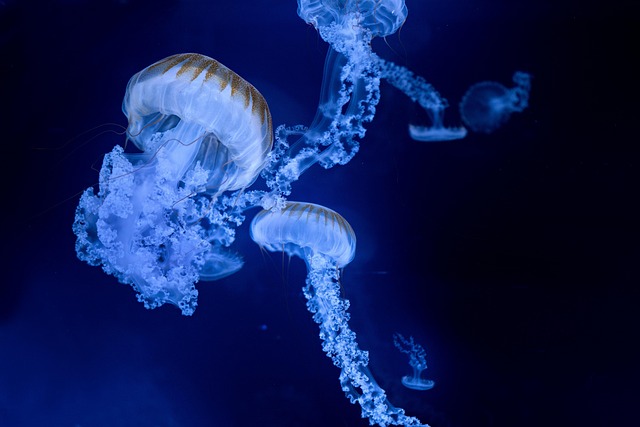Small reef aquariums (nano tanks) are gaining popularity among aquarists as an eco-friendly alternative to traditional aquariums. Their compact size reduces energy consumption, minimizing environmental impact and costs. These tanks support diverse marine life, promote urban integration with nature, and feature innovative technology for efficient water management. By offering both aesthetic appeal and sustainability, small reef aquariums represent a game-changer in the aquarium hobby, driven by a desire to protect natural ecosystems while enjoying their beauty indoors.
In recent years, the popularity of small reef aquariums has surged among both hobbyists and professionals. These compact marine wonders offer a unique way to experience vibrant coral reefs in limited spaces. However, traditional aquariums often come with significant environmental footprints due to high energy consumption. This article explores how eco-friendly nano tanks address these concerns by leveraging innovative design and technology to reduce power usage while maintaining healthy aquatic ecosystems, making them a sustainable alternative for small-scale reef enthusiasts.
Understanding Small Reef Aquariums: A Growing Trend
Small reef aquariums, also known as nano tanks, have emerged as a popular trend among both seasoned aquarist and hobbyists looking to bring a slice of coral reefs into their homes. These compact marine ecosystems offer a unique opportunity to observe and appreciate the beauty of aquatic life in a space-efficient manner. Despite their miniature size, small reef aquariums can teem with diverse species, from colorful fish and captivating corals to delicate invertebrates.
The appeal of nano tanks lies not only in their aesthetic charm but also in their sustainability and low environmental impact. As awareness about eco-friendliness grows, many aquarists are opting for energy-efficient solutions like LED lighting systems and controlled circulation pumps, which significantly reduce energy consumption compared to traditional aquarium setups. This shift towards smaller, more sustainable aquariums reflects a broader trend among consumers who seek harmonious coexistence with nature, even within the confines of their living spaces.
The Environmental Impact of Traditional Aquariums
Traditional aquariums, while beautiful and captivating, have a significant environmental impact, especially when it comes to small reef aquariums. The process of setting up and maintaining these aquatic ecosystems often involves high energy consumption due to constant water circulation, lighting for coral growth, and heating or cooling systems. This not only contributes to carbon emissions but also has economic implications for aquarium owners over time.
Moreover, the collection and transportation of live corals and other marine life for small reef aquariums can lead to habitat destruction and disruption of natural ecosystems. The demand for these delicate organisms often drives unsustainable practices, further exacerbating the environmental impact. Eco-friendly nano tanks with low energy consumption aim to mitigate these issues by offering a more sustainable alternative for aquarium enthusiasts.
Nano Tanks as a Sustainable Alternative
Nano tanks, or small reef aquariums, are gaining popularity as an eco-friendly alternative to larger aquarium setups. Their compact size and low energy requirements make them a sustainable choice for both hobbyists and commercial applications. By minimizing water volume, these tanks reduce the need for excessive heating and lighting, cutting down on electricity consumption and associated environmental impact.
This innovative approach not only conserves resources but also contributes to a more efficient use of space, particularly in urban settings where real estate is precious. Moreover, nano tanks encourage a mindful approach to aquarium keeping, fostering a deeper connection with nature and promoting responsible ownership.
Low Energy Consumption: Design and Technology Innovations
Eco-friendly nano tanks with low energy consumption are revolutionizing the way we think about small reef aquariums. Design innovations focus on maximizing efficiency through smart engineering. For instance, some models employ advanced LED lighting systems that mimic natural sunlight patterns, reducing energy waste and promoting coral growth. These lights can be programmed to adjust brightness and spectrum according to the tank’s ecosystem needs, ensuring optimal conditions without excessive power draw.
Technology also plays a significant role in minimizing energy consumption. Advanced water circulation pumps with variable speeds and smart sensors ensure water is moved efficiently only when necessary. Automatic feeders reduce the need for constant running, while integrated filtration systems utilize cutting-edge media to remove impurities effectively with minimal energy. These features contribute to a balanced ecosystem within small reef aquariums, offering both aesthetic appeal and environmental sustainability.
Small reef aquariums are gaining popularity, driven by both hobbyists seeking eco-friendly marine environments and the need for sustainable alternatives to traditional aquariums. By leveraging innovative design and technology, nano tanks offer a compelling solution with significantly reduced energy consumption. These advancements not only cater to the growing demand for compact aquatic systems but also contribute to minimizing the environmental footprint associated with aquarium ownership, ensuring a greener future for both humans and marine ecosystems.
